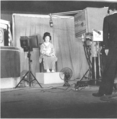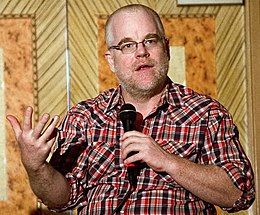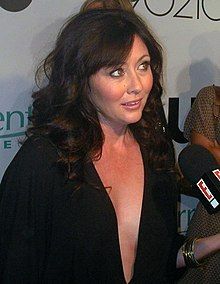Portal:Television
The Television Portal

Television (TV) is a telecommunication medium for transmitting moving images and sound. Additionally, the term can refer to a physical television set rather than the medium of transmission. Television is a mass medium for advertising, entertainment, news, and sports. The medium is capable of more than "radio broadcasting," which refers to an audio signal sent to radio receivers.
Television became available in crude experimental forms in the 1920s, but only after several years of further development was the new technology marketed to consumers. After World War II, an improved form of black-and-white television broadcasting became popular in the United Kingdom and the United States, and television sets became commonplace in homes, businesses, and institutions. During the 1950s, television was the primary medium for influencing public opinion. In the mid-1960s, color broadcasting was introduced in the U.S. and most other developed countries.
In 2013, 79% of the world's households owned a television set. The replacement of earlier cathode-ray tube (CRT) screen displays with compact, energy-efficient, flat-panel alternative technologies such as LCDs (both fluorescent-backlit and LED), OLED displays, and plasma displays was a hardware revolution that began with computer monitors in the late 1990s. Most television sets sold in the 2000s were still CRT, it was only in early 2010s that flat-screen TVs decisively overtook CRT. Major manufacturers announced the discontinuation of CRT, Digital Light Processing (DLP), plasma, and even fluorescent-backlit LCDs by the mid-2010s. LEDs are being gradually replaced by OLEDs. Also, major manufacturers have started increasingly producing smart TVs in the mid-2010s. Smart TVs with integrated Internet and Web 2.0 functions became the dominant form of television by the late 2010s.[better source needed] (Full article...)
Selected article -
"Soprano Home Movies" is the thirteenth episode of the sixth season of the HBO television drama series The Sopranos and seventy-eighth episode overall. It served as the midseason premiere to the second part of the show's sixth season, the broadcast of which was split into two. It was written by supervising producers Diane Frolov and Andrew Schneider, series creator/executive producer David Chase and executive producer Matthew Weiner; it was directed by frequent series director Tim Van Patten. The episode first aired in the United States on April 8, 2007. "Soprano Home Movies", which is set eight months after the preceding episode, details a weekend that series protagonist Tony Soprano (James Gandolfini) and his wife Carmela (Edie Falco) spend with his sister Janice (Aida Turturro) and brother-in-law Bobby (Steve Schirripa) at a lakefront vacation home in upstate New York and the complications that arise during this weekend. The episode garnered a number of award nominations and was submitted to Emmy Award voters to represent the season, leading to a nomination for Outstanding Drama Series, an award the show subsequently won.
Selected image -

A professional video camera (often called a television camera even though the use has spread) is a high-end device for recording electronic moving images (as opposed to a movie camera, that records the images on film).
Did you know (auto-generated) -

- ... that CBS executive Laurence Tisch found out on a tennis court in the U.S. Virgin Islands that rival network NBC had bought his company's affiliate station in Miami?
- ... that a television station spent so little on programming that a media columnist called it the "IOUs of Cincinnati"?
- ... that just four years after starting up, the president of Satellite Television & Associated Resources commented that his entire industry had "gone down the drain"?
- ... that Angelito de Canal 13, the mascot of the Chilean television network Canal 13, was inspired by its creator's son?
- ... that the radio station at Western Washington University interfered with telephone and television services in a campus dormitory?
- ... that Jaega Wise co-hosted the television series Beer Masters alongside musician James Blunt?
Selected quote -
More did you know
- ...that David Letterman parodied Werner Erhard in the 1978 Mork & Mindy episode Mork Goes Erk?
- ...that the 1994 Guinness television advertisement Anticipation used jump cutting techniques to make an actor appear to be performing a physically impossible dance?
- ...that the proposed BBC television special Planet Relief, created to raise awareness of climate change, was cancelled before it was made, for fear that it would be biased against climate sceptics?
- ...that the television drama Hill Street Blues imitated the visual style of The Police Tapes, a low-budget documentary about a police precinct in the South Bronx?
- ...that like the characters in his television series The Practice and Boston Legal, David E. Kelley worked as a lawyer in a Boston law firm?
Selected biography -
Daniel Louis Castellaneta (/ˌkæstələˈnɛtə/ KAST-ə-lə-NET-ə; born October 29, 1957) is an American actor and writer. He is best known for voicing Homer Simpson on the animated series The Simpsons (as well as other characters on the show such as Grampa Simpson, Krusty the Clown, Groundskeeper Willie, Mayor Quimby, Sideshow Mel, Mr. Teeny, Santa's Little Helper, Itchy, and Barney Gumble). Castellaneta is also known for voicing Grandpa in Nickelodeon's Hey Arnold!, and has had voice roles in several other programs, including Futurama, Sibs, Darkwing Duck, The Adventures of Dynamo Duck, The Batman, Back to the Future: The Animated Series, Aladdin, Earthworm Jim, and Taz-Mania.
In 1999, he appeared in the Christmas special Olive, the Other Reindeer and won an Annie Award for his portrayal of the Postman. Castellaneta released a comedy album I Am Not Homer, and wrote and starred in a one-person show titled Where Did Vincent van Gogh? (Full article...)
General images
News
- December 28: US professional wrestler Jon Huber dies aged 41
- September 2: Tributes paid to recently deceased US actor Chadwick Boseman
- May 24: Japanese professional wrestler and Netflix star Hana Kimura dies aged 22
- January 16: BBC newsreader Alagiah to undergo treatment for bowel cancer
- Upcoming events
Featured content
Main topics
History of television: Early television stations • Geographical usage of television • Golden Age of Television • List of experimental television stations • List of years in television • Mechanical television • Social aspects of television • Television systems before 1940 • Timeline of the introduction of television in countries • Timeline of the introduction of color television in countries
Inventors and pioneers: John Logie Baird • Alan Blumlein • Walter Bruch • Alan Archibald Campbell-Swinton • Allen B. DuMont • Philo Taylor Farnsworth • Charles Francis Jenkins • Boris Grabovsky • Paul Gottlieb Nipkow • Constantin Perskyi • Boris Rosing • David Sarnoff • Kálmán Tihanyi • Vladimir Zworykin
Technology: Comparison of display technology • Digital television • Liquid crystal display television • Large-screen television technology • Technology of television
Terms: Broadcast television systems • Composite monitor • HDTV • Liquid crystal display television • PAL • Picture-in-picture • Pay-per-view • Plasma display • NICAM • NTSC • SECAM
Categories
WikiProjects

|
You are invited to participate in WikiProject Television, a WikiProject dedicated to developing and improving articles about Television. |
- Main projects
- Sub-projects
Television Stations • American animation • American television • Australian television • British TV • BBC • Canadian TV shows • Television Game Shows • ITC Entertainment Productions • Digimon • Buffyverse • Doctor Who • Degrassi • EastEnders • Episode coverage • Firefly • Futurama • Grey's Anatomy • Indian television • Lost • Nickelodeon • The O.C. • Professional Wrestling • Reality TV • The Simpsons • Seinfeld • South Park • Stargate • Star Trek • Star Wars • Soap operas • Avatar: The Last Airbender • House
- Related projects
Animation • Anime and manga • Comedy • Comics • Fictional characters • Film • Media franchises
What are WikiProjects?
Things you can do

- Place the {{WikiProject Television}} project banner on the talk pages of all articles within the scope of the project.
- Write: Possible Possum
- Cleanup: color television, Alien Nation: Body and Soul, The Sopranos, Alien Nation: Dark Horizon, Alien Nation: The Enemy Within, Alien Nation: Millennium, Aang
- Expand: Timeline of the introduction of color television in countries
- Stubs: Flow (television), Just for Kicks (TV series), Play of the Month, Nova (Dutch TV series), More stubs...
Subportals
Related portals
Associated Wikimedia
The following Wikimedia Foundation sister projects provide more on this subject:
-
Commons
Free media repository -
Wikibooks
Free textbooks and manuals -
Wikidata
Free knowledge base -
Wikinews
Free-content news -
Wikiquote
Collection of quotations -
Wikisource
Free-content library -
Wikiversity
Free learning tools -
Wiktionary
Dictionary and thesaurus





































































